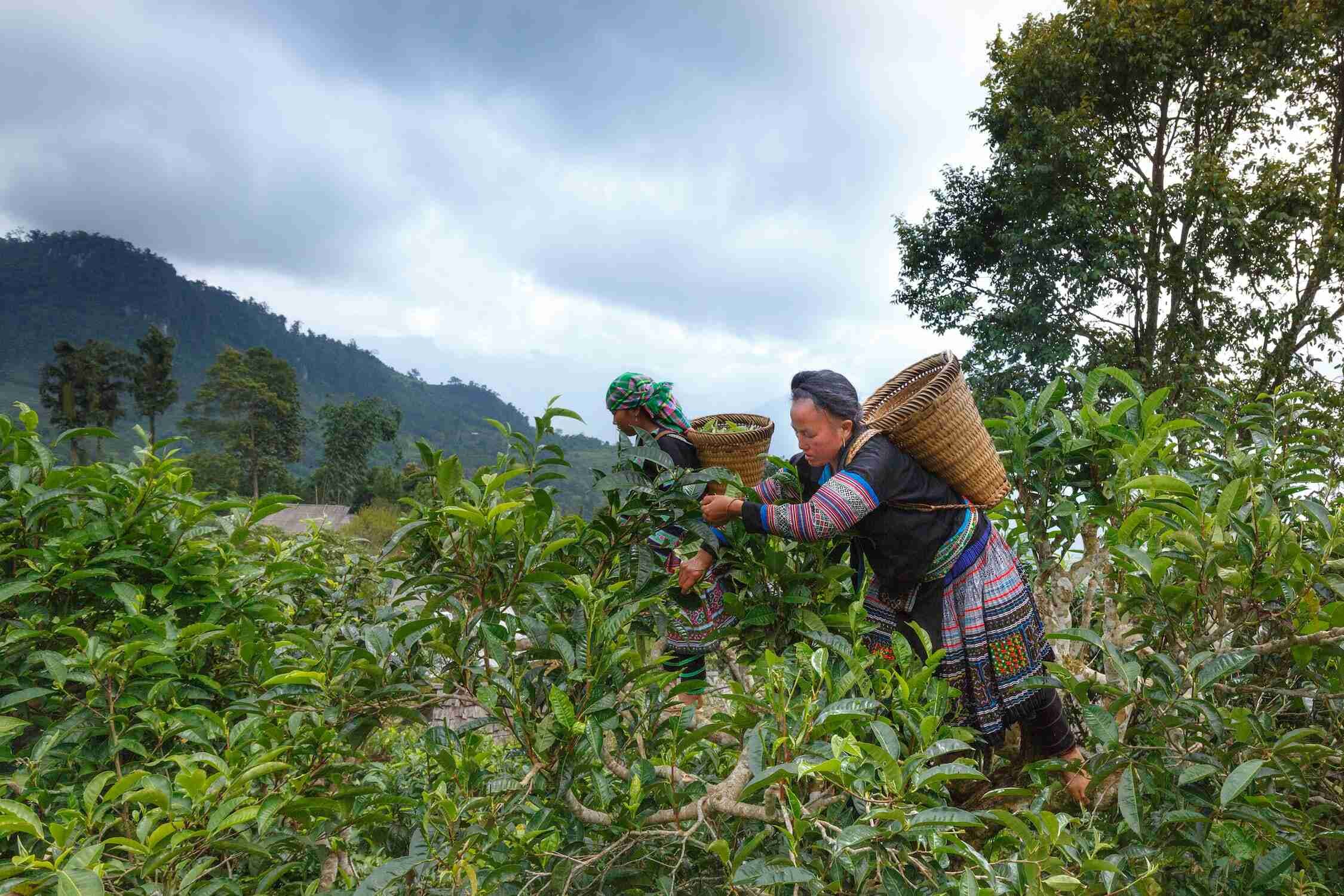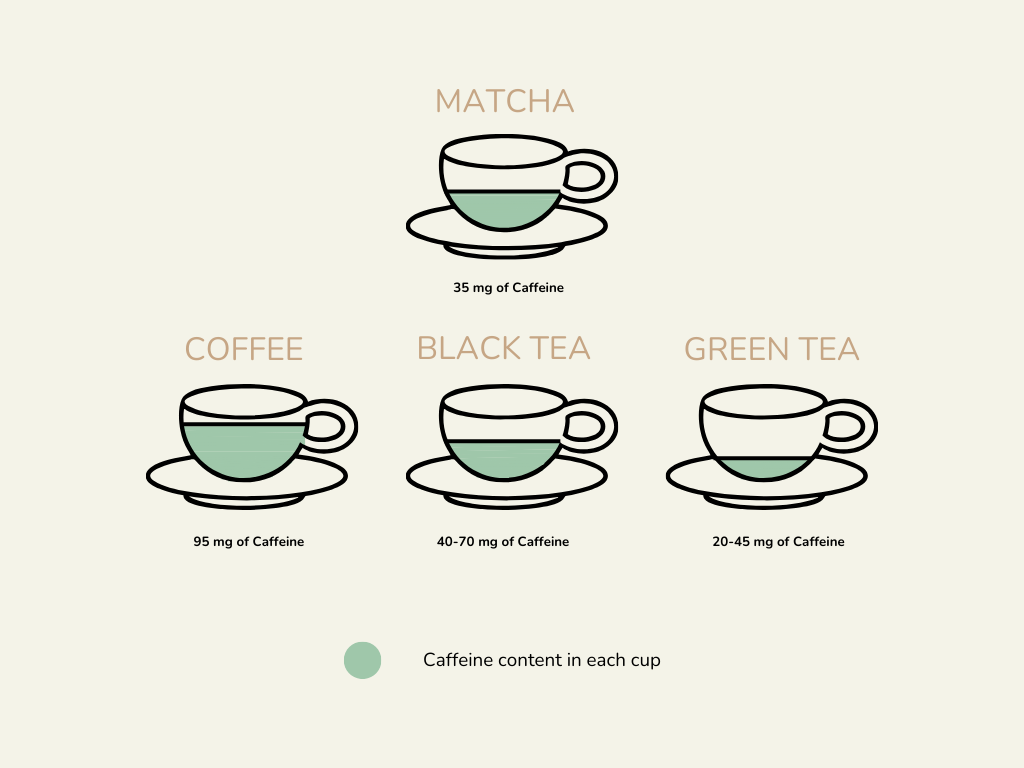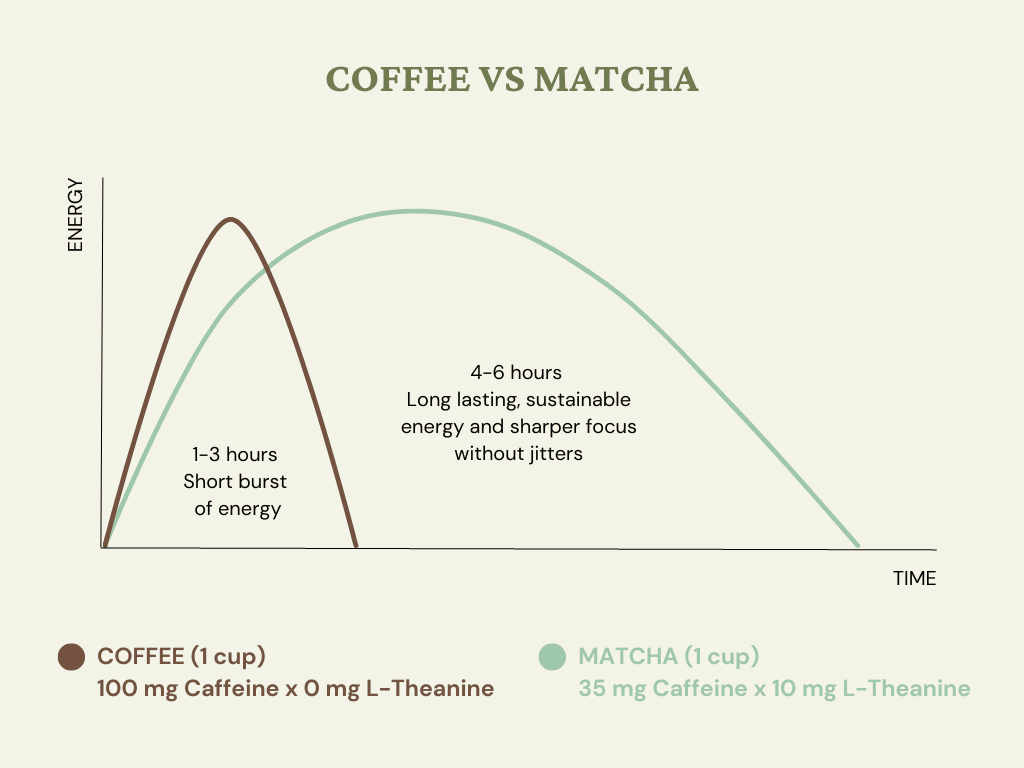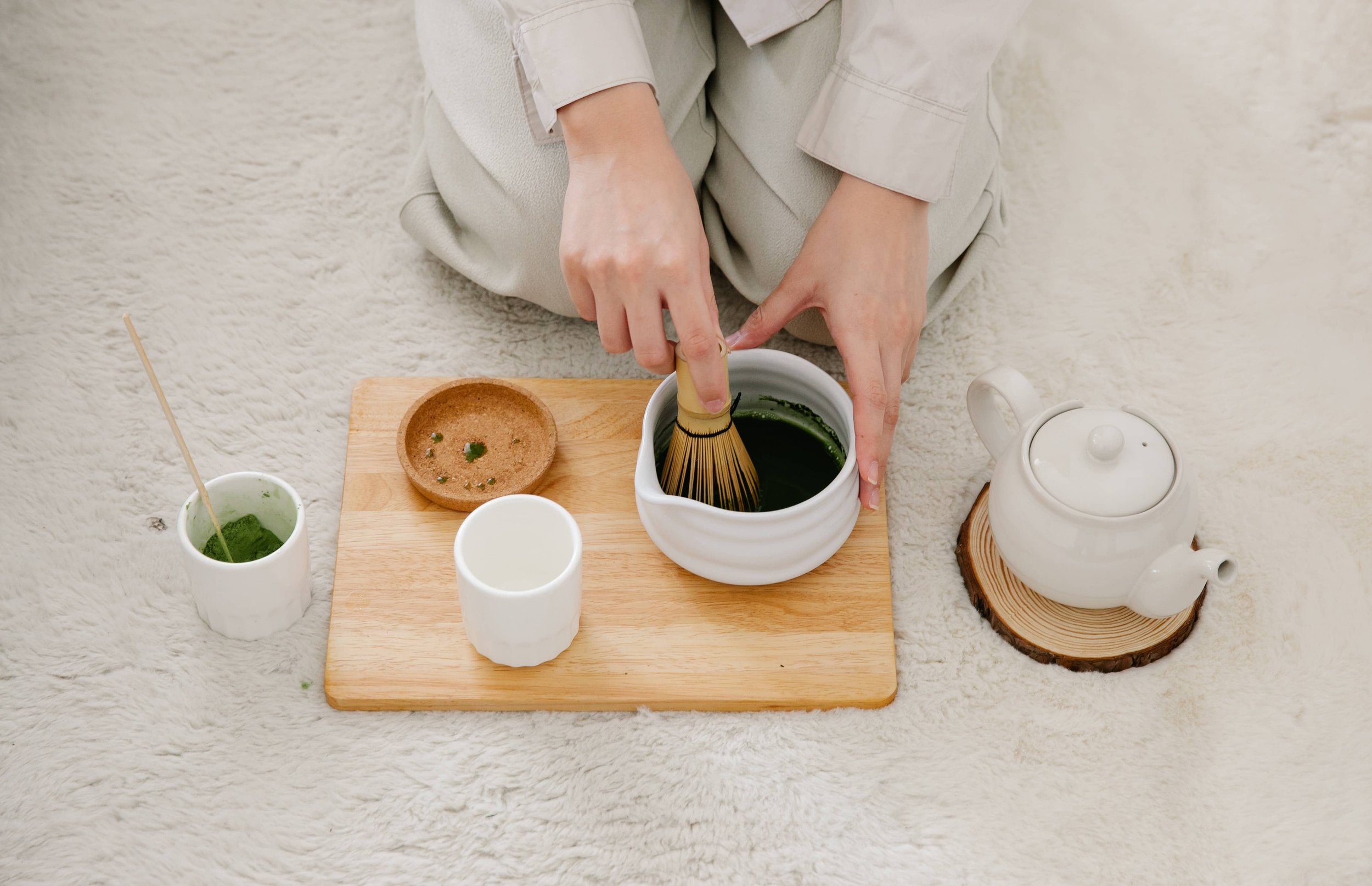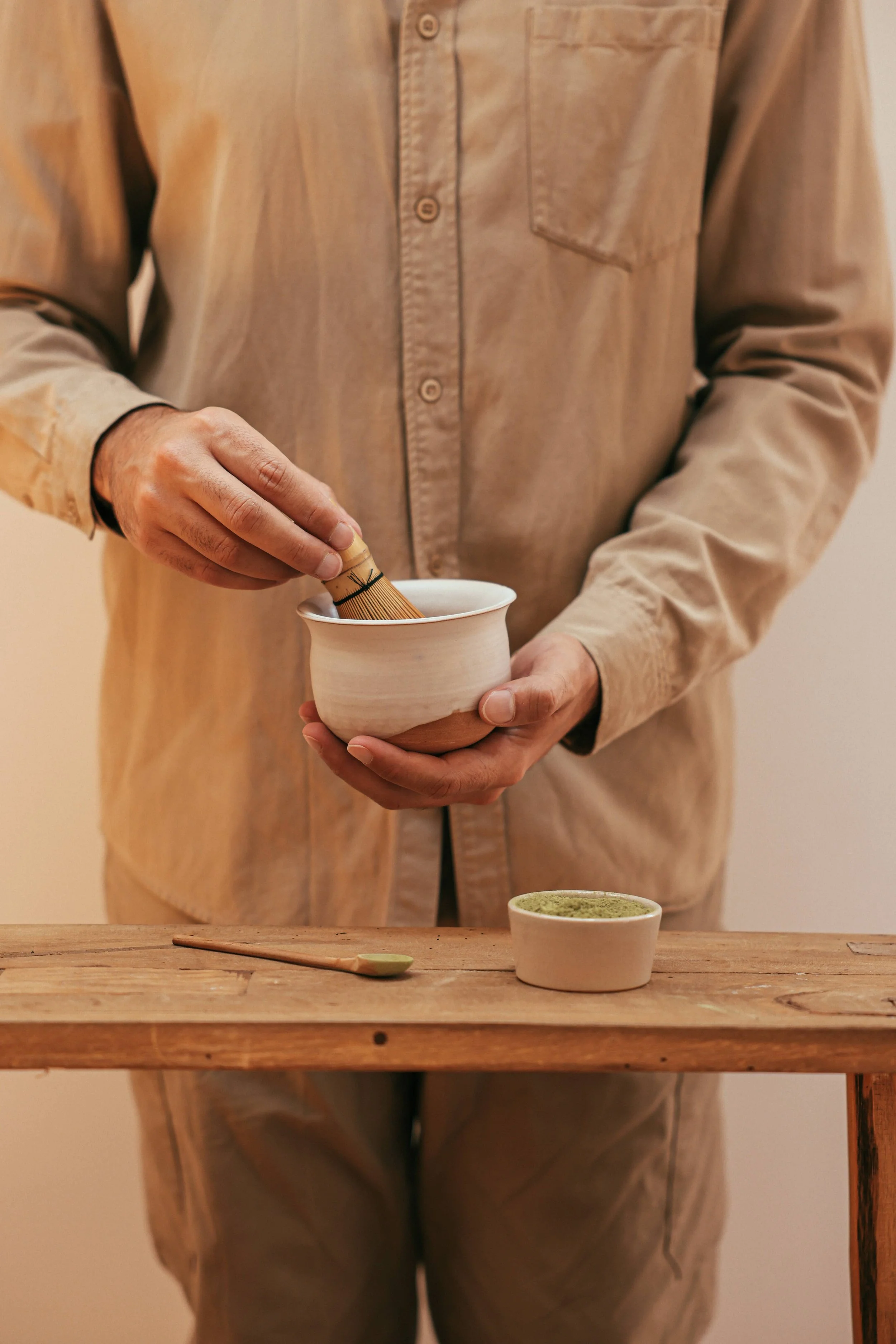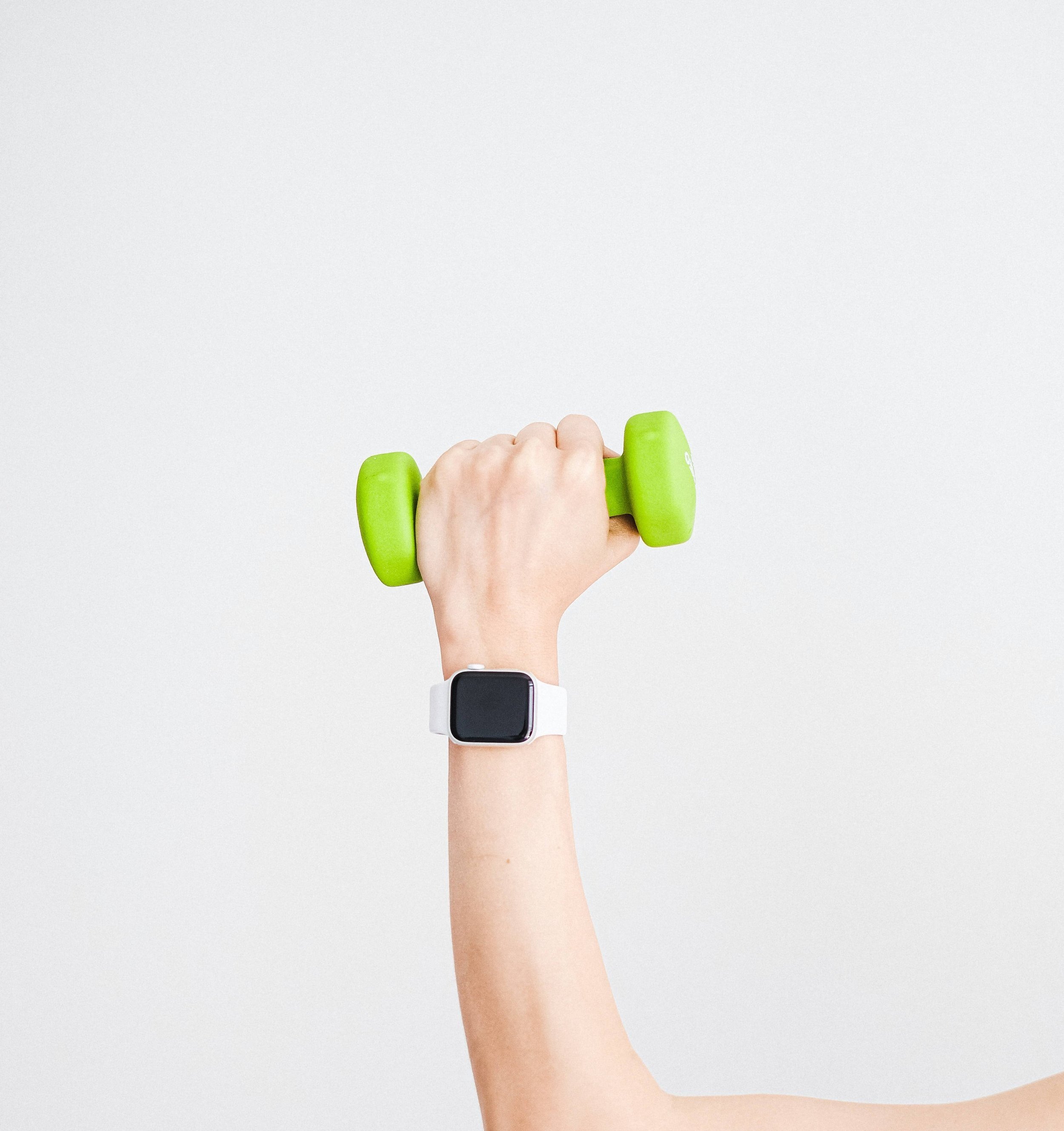DOES MATCHA
CONTAIN
CAFFEINE
Indulging in a soothing cup of matcha is a delightful experience, but for those who are mindful of their caffeine intake, it raises an important question: Does matcha contain caffeine? The answer is a resounding yes! Let's delve into the fascinating world of matcha to uncover the truth behind its caffeine content.
UNDERSTANDING MATCHA’S ORIGINS
To truly grasp the caffeine content of matcha, it's essential to explore its origins and how it differs from traditional steeped green tea. Matcha finds its roots in ancient Japanese tea ceremonies dating back to the 12th century. Its distinct cultivation process involves shading tea plants from sunlight for several weeks before harvest, which enhances chlorophyll production and boosts the concentration of beneficial compounds.
THE HARVESTING AND PROCESSING
Before harvest, the tea leaves are carefully hand-picked, and only the finest, young leaves are chosen to make matcha. After harvesting, the leaves are steamed to prevent oxidation and retain their vibrant green color. The dried leaves are then ground into a fine powder using traditional granite stone mills, resulting in the beloved matcha powder.
SO, DOES MATCHA CONTAIN CAFFEINE ?
The short answer is yes, matcha does contain caffeine, but the levels are not as high as you might expect. The caffeine content in matcha can vary based on factors such as the growing conditions, harvesting techniques, and the quality of the tea leaves. On average, a standard serving of matcha (about one teaspoon) contains approximately 35 milligrams of caffeine.
COMPARING MATCHA TO OTHERS CAFFEINATED BEVERAGES
Coffee: An 8-ounce cup of brewed coffee typically contains around 95 milligrams of caffeine, more than double the amount found in matcha.
Black Tea: An 8-ounce cup of black tea generally contains about 40-70 milligrams of caffeine, which is similar to or slightly higher than matcha.
Green Tea: An 8-ounce cup of green tea typically contains around 20-45 milligrams of caffeine, which is slightly lower than matcha.
THE MAGIC OF MATCHA L-THEANINE AND CAFFEINE SYNERGY
While matcha does contain caffeine, its effects on the body differ from other sources of caffeine like coffee. Matcha boasts a unique advantage with the presence of L-theanine, an amino acid not found in coffee or many other teas. L-theanine promotes relaxation and a sense of calm without causing drowsiness, perfectly complementing the stimulating effects of caffeine.
The combination of caffeine and L-theanine in matcha creates a state of focused alertness, providing a smooth and sustained energy boost without the jittery side effects often associated with coffee consumption. Many people find this harmonious synergy of caffeine and L-theanine to be a key reason they prefer matcha as a more balanced alternative to coffee.
LONGER DURATION OF EFFECTS
Due to the gradual release of caffeine and the synergy with L-theanine, the energy boost from matcha tends to last longer than that from coffee. Coffee's effects may wear off relatively quickly, leading to a feeling of fatigue or a desire for another cup. On the other hand, the sustained energy provided by matcha can help individuals remain alert and productive for an extended period.
CONCLUSION
In conclusion, matcha does contain caffeine, but its levels are moderate when compared to coffee and similar to or slightly higher than regular green tea. The unique combination of caffeine and L-theanine in matcha offers a more balanced and gentle energy lift, making it a favored choice for those seeking a mindful and focused state of alertness.
If you're sensitive to caffeine or strictly limiting your intake, you can still enjoy matcha in moderation or explore ceremonial-grade or decaffeinated options available in the market. As with any dietary choice, it's best to listen to your body and consult with a healthcare professional if you have specific health concerns or conditions related to caffeine consumption.
*An adult’s caffeine consumption should not exceed 400 mg per day. One cup of 1g of matcha tea contains 35mg of caffeine and it is recommended not to drink more than 5 cups of matcha per day.
Since switching from being a daily coffee consumer to a matcha drinker, We’ve experienced a notable improvement in our energy levels. Unlike the abrupt energy spike and crash with coffee, matcha offers a smoother, more sustained boost. This change has significantly enhanced our daily routine and overall wellbeing, without the harsh comedown we used to face with coffee. If you haven't tried it yet and are unsure about which matcha to choose, here is our selection to help you get started:
CEREMONIAL GRADE:
The Tao of Tea Organic Ceremonial Matcha; creamy, sweet, and rich oceanic taste. Available Here.
Maeda-En Matcha Ceremonial Grade Green Tea Powder; Bright electric green color, middle of the road, not too umami, not to grassy, not too seaweedy...all in all nicely balanced matcha whether prepared thin or thick. Available Here.
PRENIUM GRADE:
T2 Tea Organic Green Tea Matcha Powder; Reputable brand. Great and high quality matcha powder, although we wouldn't recommend this if you're making matcha latte. Good for making matcha on its own. Available Here.
Kagoshima Organic Matcha Green Tea Powder; This matcha is pricey (by any means) but particularly for the flavour it provides. It is very mild. It is not grassy, sweet or bitter, just perfect. We love the taste. You can find it Here.
CULINARY:
Matcha Wellness Organic Matcha tea, Authentic Japanese from Uji - Kyoto - Culinary Grade; We have tried different brands of matcha powder to make a latte, and this brand is one of the best for us. Available Here.
Orku 600g Organic Matcha Powder Tub Bucket; Ideal for bakers and chefs, this variant is available in bulk quantities, ensuring you never run out during your cooking adventures. Plus, buying in larger volumes offers considerable cost savings. Available Here.
RELATED ARTICLES
As you embark on this enchanting journey, prepare to explore the intricacies that distinguish superior matcha from the rest. From its vibrant green color to its delicate aroma and nuanced flavor profiles, every aspect plays a role in... Read more
ESSENTIAL ACCESSORIES : EVERYTHING YOU NEED
Preparing matcha requires specific accessories to achieve a perfect infusion. In this article, we will introduce you to the essential accessories… Read more
There are several grades available on the market. The grading system helps to categorize matcha based on quality, flavor profile, and intended use.
Read more
Full of antioxidants and other healthful compounds, matcha is made up of finely powdered, young tea leaves… Read more
Matcha, the vibrant green powdered tea that has taken the world by storm, has a rich history that spans centuries. From its origins in ancient China to… Read more
HOW TO PREPARE A PERFECT MATCHA ?
Making a cup of matcha is more than just a simple tea preparation; it's an art that elevates the senses and nourishes the soul… Read more
In recent years, matcha lattes have gained immense popularity as a soothing and flavorful alternative to traditional coffee-based drinks.
Read more
Join us on this culinary journey as we explore the incredible ways matcha can transform your recipes. Read more
If you're looking for a delicious and nutritious way to incorporate matcha into your diet, smoothies are the perfect solution. Read more
Achieving optimal performance during your workouts requires proper nutrition and energy support. One powerful ally in your fitness journey is matcha… Read more
BENEFITS OF MATCHA FOR WEIGHT LOSS
In the pursuit of a healthy lifestyle and weight management, finding natural and effective methods can make all the difference. One such method that has gained popularity is matcha… Read more


